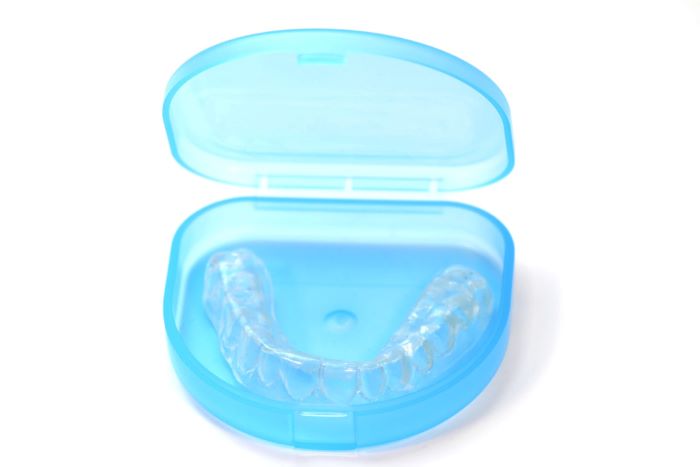Importance of Retainers
What are retainers and how do they work?
Made from either metal or plastic, retainers are a special kind of orthodontic tool that can be used to keep teeth in place. They’re specifically used after an individual has traditional braces removed or after they stop using Invisalign trays. Retainers are intended to help keep teeth from shifting after they’ve been straightened. They’re fitted to each individual patient, meaning that each set is completely unique and custom-made to fit the patient’s mouth. Because they’re molded to fit the patient’s teeth exactly, they’re able to prevent shifting of the teeth and minimize the effects of teeth grinding (bruxism), while offering other benefits as well.
Depending on your personal situation and why you need retainers, Fine Dentistry of Downtown Orlando may suggest different retainer types or indicate different durations of wear. The use of retainers is customized to each patient, and we make sure to do a thorough examination and assessment before recommending a particular retainer type and treatment plan.
Types of Retainers
There are many different kinds of retainers, and the type that your dentist prescribes for you to wear will depend on your individual situation and needs. Fine Dentistry of Downtown Orlando offers various retainer brands and types to our patients, and we consult with you about which retainer type is best before making the final decision. Your retainers will be with you for a while, so it’s important that they’re comfortable and functional for you! Below are the two most common types of retainers that you’d be likely to receive from your dentist:
● Permanent retainers
Permanent retainers involve a piece of wire that is curved and bonded to the back of your teeth. They function to hold teeth in place that have been recently straightened. These types of retainers are also called bonded, fixed, or lingual wire retainers, and they’re most commonly used on the bottom teeth. However, permanent retainers are still sometimes recommended for upper teeth as well, but this is determined on a case-by-case basis.
● Removable retainers
As per their name, removable retainers can be taken out of the mouth easily whenever the individual eats, brushes their teeth, or performs other activities that require removal of the retainer. Removable retainers can be made with either wire or plastic, although the clear, plastic retainers are becoming more popular because of their more appealing aesthetics and increased comfort. But wire removable retainers are more durable and can be customized for a better fit if needed. Both wire and plastic removable retainers have their pros and cons.
If you recently had your braces removed or want to keep your teeth straight for the long run, make sure to contact Fine Dentistry of Downtown Orlando to schedule an appointment. Retainers are essential to keep freshly straightened teeth in place over a long period of time and it’s important to start using retainers right away. Every patient is different, but our dentists make sure to take your unique situation into account when we examine you for retainers so that we can offer you the best and most personalized solution possible.
Why Retainers Are Important
The importance of retainers cannot be understated, especially when it comes to maintaining a beautiful, straight set of teeth over the long-term. Keeping your teeth in place after braces or Invisalign is nearly impossible without retainers. The importance of retainers should not be underestimated! Here are just a few of the reasons why you may need to get retainers:
- They keep teeth from shifting after braces or Invisalign
- They can reduce the effects of teeth grinding or bruxism
- They can diminish symptoms of temporomandibular joint syndrome (TMJ)
- Special retainers can be used to make teeth even straighter after braces
Regardless of what type of retainer you get, they’re custom made to fit your mouth and teeth. Permanent wire retainers are fitted to the back of your teeth using dental cement, and removable retainers are also molded to fit your mouth. As such, just like braces and Invisalign, retainers are a highly personal dental maintenance tool and are by far one of the most important items that people need to maintain straight teeth throughout their lives. Patients who have never had braces or Invisalign, may still be prescribed retainers if the dentist believes that future teeth shifting can be prevented. This is especially true with children. So, retainers can both maintain the results of braces as well as prevent the need for braces in the future!
After your braces are removed, Fine Dentistry of Downtown Orlando recommends that patients come into the office for a checkup appointment one month after treatment, and then also at 3 months, 6 months, 11 months, and 24 months after removal. If you’re wearing a retainer at this time, your dentist will be able to check the fit of the retainer and ensure that it’s doing its job properly. This is essential because the retainer is a maintenance and care device for your teeth. If you don’t already have a retainer, your dentist will be able to see if your teeth are shifting and can recommend a retainer for you immediately to stop the shifting from happening.
Here at Fine Dentistry of Downtown Orlando, we advise our patients on how to wear their retainers based on what we know about their personal health, both physical and oral. Some patients may need a special kind of removable retainer to maintain the results achieved after having their braces removed, while other patients may require a combination of removable and permanent retainers. There are many different options available. A trip to your dentist’s office for an appointment can help clear up any doubts or questions you may have about which retainers are right for you.
How long will I have to wear retainers?
For patients who have recently had braces and will be wearing retainers to minimize shifting, Fine Dentistry of Downtown Orlando generally recommends that they wear the retainers every day, all day for between 6 months to one year (or longer, in some cases). This means that the retainers will only be able to be removed from the mouth during meals and for tooth-brushing and flossing. After this period of time, you may be able to start wearing the retainers intermittently, such as only at night or only for 3 days of the week. Consult with your dentist about this, and don’t make this decision yourself because you risk setbacks and shifting of your straight teeth if you don’t wear the retainers the proper amount of time.






Please login to publish a comment.
Comments (0)